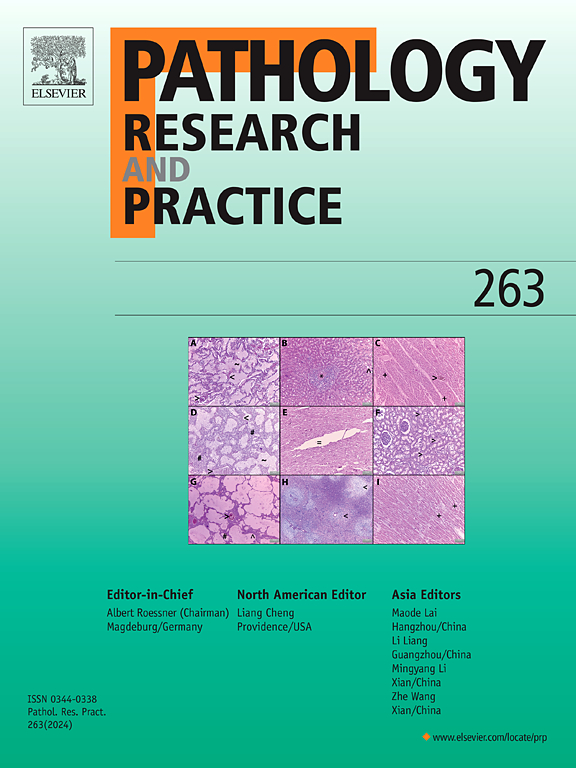鉴别glypican 3阳性胃癌的临床病理意义
IF 2.9
4区 医学
Q2 PATHOLOGY
引用次数: 0
摘要
目的探讨胃癌组织中Glypican 3 (GPC3)的表达情况,探讨GPC3阳性胃癌(GPC3- gc)的临床病理预后因素。方法采用TCGA-STAD数据库和免疫组化检测,分析GPC3基因在胃腺癌组织中的表达及生存差异。结果生物信息学分析显示GPC3基因在胃腺癌组织中高表达(P <; 0.05),单因素Cox回归分析进一步显示GPC3的风险比(HR)为1.8 (95% CI: 1.3 ~ 2.5) (P <;0.001)。在本研究的218例胃腺癌组织样本中,GPC3阳性率为17.0 %(37/218),在血清AFP升高的病例中,GPC3阳性率为53.6 %(15/28)。肝转移在gpc3阳性胃癌中更为常见(P <; 0.001)。gpc3阳性多见于肝样或肠母细胞分化、T3深度 + T4、临床TNM分期III+IV期的腺癌(P均为 <; 0.05)。Kaplan-Meier结果显示gpc3阴性组和gpc3阳性组之间存在显著差异(P <; 0.001)。gpc3 -局灶性肿瘤与弥漫性肿瘤间无显著差异(P >; 0.05)。Cox回归分析发现gpc3阳性是影响胃腺癌术后预后的危险因素(P <; 0.001)。但GPC3不能独立于其他指标作为预后指标(P >; 0.05)。结论ongpc3在部分胃腺癌中表达,特别是在血清AFP水平升高的胃癌中表达,为临床监测和探索新的免疫治疗靶点提供了潜在的依据。GPC3-GC通常表现出很强的侵袭和转移能力,可能预后较差,特别是在肠母细胞分化和血清AFP升高的情况下。因此,提高认识并将GPC3-GC与普通腺癌区分开来至关重要。本文章由计算机程序翻译,如有差异,请以英文原文为准。
Clinicopathological significance of identifying glypican 3 -positive gastric cancer
Objective
The aim of this study was to investigate the expression of Glypican 3 (GPC3) in gastric cancer and to identify clinicopathological prognostic factors associated with GPC3-positive gastric cancer (GPC3-GC).
Methods
Gene expression and survival differences of GPC3 were analyzed by the TCGA-STAD database and immunohistochemical detection in the gastric adenocarcinoma tissues.
Results
Bioinformatic analysis revealed that the GPC3 gene was highly expressed in gastric adenocarcinoma tissues (P < 0.05), and Univariate Cox regression analysis further demonstrated that the hazard ratio (HR) for GPC3 was 1.8 (95% CI: 1.3-2.5) (P < 0.001). Among the 218 cases of gastric adenocarcinoma tissue samples in this study, the positive rate of GPC3 was 17.0 % (37/218), increasing to 53.6 % (15/28) in cases with elevated serum AFP. Liver metastasis is more common in GPC3-positive gastric cancer (P < 0.001). GPC3-positive was more prevalent in adenocarcinomas with hepatoid or enteroblastic differentiation, depth of T3 + T4, clinical TNM stage III+IV (all P < 0.05). The Kaplan-Meier results revealed significant differences between the GPC3-negative and GPC3-positive groups (P < 0.001). However, no significant difference was found between GPC3-focal and diffuse tumors (P > 0.05). Cox regression analyses identified GPC3-positive as a risk factor affecting postoperative prognosis in gastric adenocarcinoma (P < 0.001). However, GPC3 can’t serve as a prognostic indicator independent of other indicators (P > 0.05).
Conclusion
GPC3 is expressed in some cases of gastric adenocarcinoma, particularly in cancers with elevated serum AFP levels, providing a potential basis for clinical monitoring and exploring new immunotherapy targets. GPC3-GC often exhibits strong invasive and metastatic capabilities and may carry a poor prognosis, especially in cases with enteroblastic differentiation and elevated serum AFP. Therefore, it is crucial to enhance awareness and differentiate GPC3-GC from common adenocarcinoma.
求助全文
通过发布文献求助,成功后即可免费获取论文全文。
去求助
来源期刊
CiteScore
5.00
自引率
3.60%
发文量
405
审稿时长
24 days
期刊介绍:
Pathology, Research and Practice provides accessible coverage of the most recent developments across the entire field of pathology: Reviews focus on recent progress in pathology, while Comments look at interesting current problems and at hypotheses for future developments in pathology. Original Papers present novel findings on all aspects of general, anatomic and molecular pathology. Rapid Communications inform readers on preliminary findings that may be relevant for further studies and need to be communicated quickly. Teaching Cases look at new aspects or special diagnostic problems of diseases and at case reports relevant for the pathologist''s practice.

 求助内容:
求助内容: 应助结果提醒方式:
应助结果提醒方式:


